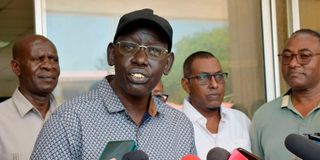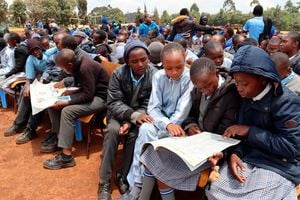
Education PS Belio Kipsang addresses the press at Uhuru Na Kazi Building on January 2, 2025 in Mombasa County.
Parents with learners in the 349 schools that were barred from hosting boarders have been asked to transfer them to other learning institutions before schools reopen on Tuesday next week due to safety concerns.
The Ministry of Education urged the parents to ensure their children are placed in different schools after an audit conducted following the fire tragedy that killed 21 learners from Hillside Endarasha Academy tragedy four months ago revealed glaring safety issues in the 349 schools.
The audit revealed that most boarding primary schools are grappling with safety and infrastructural challenges that put the lives of learners at risk. A total of 2,974 schools were assessed, of which 1,415 were public and 1,659 were private.
Congestion in the dormitories was common in the schools. The spacing between the beds in most schools was less than 1.2 metres, while the corridor or pathway space was less than two metres, contrary to the of the Safety Standards Manual for Schools in Kenya (2008).
A few schools did not have patrons/wardens for boys dormitories. In some schools, the matrons were assigned roles in dormitories for male learners.
Basic Education Principal Secretary Belio Kipsang said the government will not back down on the directive banning some schools from hosting boarders.
“We told institutions that were not adequately prepared to run boarding to stop until such a time they are properly prepared ... And each of the 349 boarding schools were given a report to tell them what they needed to do,” said Dr Kipsang.
In an interview with the Nation, Dr Kipsang said Ministry of Education officers have re-inspected some of the schools.
“Any school that has met the preparedness level will be allowed to proceed, but those who will not be ready, we have already told parents to seek alternative schools for their children and we have had enough time, almost two months, so we are not worried really on what happens to those children,” said the PS.
Dr Kipsang said ministry officials are currently consolidating data on how many boarding schools are yet to meet the safety standards.
“We are having a meeting of all our sub-county, county and regional directors today, we shall be able to know any situation that needs specific attention,” he said.
This comes as parents continue to lament over the move saying it will be a challenge and costly to buy new uniforms, and other amenities.
However, National Parents Association Chairman Silas Obuhatsa blamed parents for failing to force boards of management to adhere to safety standards before reopening.
“We fully support the government directive, which was not given yesterday., School managements were given time to make corrections for reopening, if they did not meet the standards to ensure safety of learners, they should remain closed,” said Mr Obuhatsa. “In case of any eventuality, it is the same parents that will blame the state.”
Director Quality Assurance and Standards Evelyne Owoko said the assessment of boarding primary and junior schools revealed that some schools had admitted boarders who were in pre-primary, contrary to the provisions of the Registration Guidelines for Basic Education Institutions (2021).
The inspection began in Nairobi from September 10 to 17, 2024, and to the other seven regions from September 13 to October 24, 2024. The assessments were conducted by field officers and quality assurance officers.
“Majority of the schools were not registered as boarding institutions and therefore were operating illegally,” revealed the Quality Assurance and Standards Director.
All schools with invalid registration certificates were directed to seek re-registration.
Some dormitories had windows without grills, emergency exits and doors that opened inwards. A few schools had designated boarding areas and had adhered to standards on safety for learners with disability.
“Most schools had double decker beds made of steel. A few schools had appropriate spacing between beds and the two-metre corridor or pathway. Most schools had matrons for girls dormitories,” reads the report.
A few schools had adequate, well maintained sanitation facilities.
“The sanitation facilities in most were poorly maintained and not adequate as per the Registration Guidelines (2021) and Safety Manuel for Schools in Kenya (2008). Many schools did not provide treated drinking water for learners,” said Ms Owoko.
A few schools had functional firefighting equipment and sand buckets. All learning institutions were directed to install the basic firefighting equipment and train staff and learners on their use, risk preparedness and response
In some schools, the fence was porous and without gates. In some instances where gates were available, they were not manned.
Most schools did not engage female night security guards to take care of the security needs of female learners.
Ms Owoko also directed schools to install CCTV cameras in the boarding areas.
Most of the schools had kitchen and dining facilities that lacked appropriate smoke canopies to ensure proper ventilation.
“Schools should prioritise maintenance and hygiene in the kitchen and dining area. In addition, smoke canopies should be provided in order to ensure proper ventilation,” reads the report.









